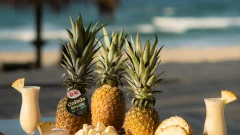True Story of How We Accidentally Ate an Endangered Species in Honduras
It really was an accident. Here’s how it all began.
A group of FOODBEAST writers, myself included, had the opportunity earlier this year to check out the latest developments from Carnival Cruise Lines. This gave us the chance` to make multiple, albeit short, international day trips in Mexico, Belize and Honduras. After spending four days mostly on the ship consuming our own weight in food, we decided that we were going to explore the Honduran island of Roatán on our own.
Roatán is an island economically bound to tourism related to its temperate Caribbean weather and the second largest barrier reef in the world. But similar to its mainland counterpart, the island and its people are extremely poor. So, as in our other stops in Mexico and Central America, we were bombarded by vendors mostly related to excursions and activities. We avoided the zip-lining, snorkeling and scuba diving in pursuit of cuisine and culture that we had never experienced before. After all, before this trip we didn’t know this island existed—so who knew when we would actually be back, if ever.
It was during our first meal at a literal shack, away from the harbor bars and restaurants, lacking signage and electricity, that we ran into Marcus. Boasting a big smile and a white polo that claimed he was an “independent tour guide,” he started giving us unprompted recommendations of what to see on the island. Although the initial subtlety of selling himself was there, his casual and welcoming nature convinced us to have him lead our journey. It would be this same trusting nature that would get us into more than we bargained for.

Marcus (our tour guide), Rudy, Marc and Elie photo-opping with kids in Marcus’ neighborhood
Past the purchase of Honduran weed, which was more like an actual weed than any ganja I’ve had stateside. Past the insane views of the Caribbean juxtaposed with derelict homes, buildings, schools and neighborhoods. Past the dozens of children running barefoot or practically barefoot after our car to sell us any variety of shells, trinkets, homemade jewelry and the like. Past the nightclub that really was a bar that really was a front for a brothel filled with scantily clad ladies seeing $$$ associated with every American that walked in. Past all of it was a restaurant. A restaurant that Marcus had been hyping up during our entire journey and our hunger had finally caught up with us.



As with most islands and coastal cities, the restaurant’s menu and locals bragged of the seafood. Without hesitating, we ordered lobster, shrimp, island fried chicken. But the real reason we were there screamed at us from a petite 1990s whiteboard taped to a pillar inside the restaurant: Especial Iguana $13.
To put the price of 13 American dollars into context, the Iguana special was pricey considering the fact that 5 American dollars could buy you a lifetime supply of hot sauce or a full round of beers. But then Marcus described the processes involved with getting that Iguana to our plate, and it’s pretty much the opposite of farm-to-table.
Step 1, enter the jungle at your own risk. Step 2, bring a dog to help you track down an Iguana and run it up a tree. Step 3, climb the tree and snatch the Iguana without getting bit. Step 4, bring your crated Iguana by multiple restaurants to see who’s buying. Step 5, begin a painstaking and arduous process of boiling the Iguana enough to be able to try and remove chunks of the thick skin off of the animal (after some sort of death/slaughter). Step 6, use your skills to make the meat delicious. Step 7, serve with rice and plantains.

Iguana, fish-like bones and all, sitting on a plate of rice and plantains
The Iguana, itself, had a consistency comparable to a lightly boiled chicken one might use in a soup, most likely more due to the type of preparation than the animal itself. I hate using the comparison to chicken, but that’s the closest thing we could all agree on. A delicate sweeter chicken, with lots and lots and lots of bones. Similar to a fish you have to fry whole because it’s impossible to filet.
And that’s when during the last bites of our meal, Marcus explained how the act of catching and selling Iguanas for food or otherwise is illegal in the country. “Here Iguana is an endangered species.”
Wait what?! If you watch the video above, you can see our candid reaction to the statement we never saw coming. Further research from the International Union for Conservation of Nature (IUCN), the organization that publishes the Red List of Threatened Species, pointed to eating the Roatán Spiny-tailed Iguana or Ctenosaura oedirhina that is endangered, but not critically endangered or extinct, in the wild. So there’s that.






















